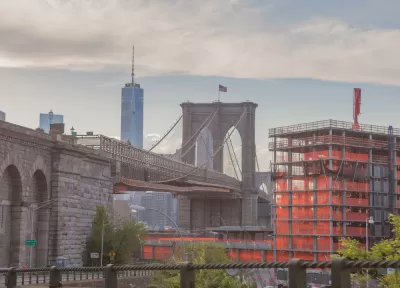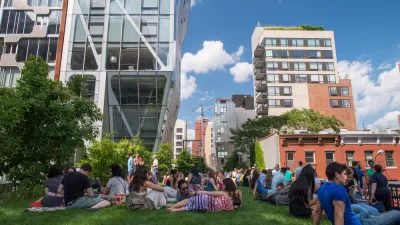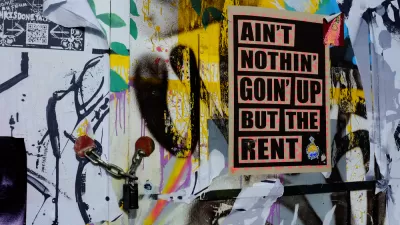Call it the re-education, the evolution, or the contrition of Richard Florida, but the "rock-star urbanist" has realized some unintended consequences of his creative class ethos, and he's ready to share a new vision for cities.

Lydia DePillis reports on the evolution of Richard Florida, who 16 years after his first book, The Rise of the Creative Class, will release a new book called The New Urban Crisis.
According to DePillis, the theories included in The Rise of the Creative Class "proved half true." That is, "[f]or many small, post-industrial cities without assets like big tech companies and universities, no amount of creative-class marketing would turn things around."
Meanwhile, "some cities — San Francisco and New York, Austin and Seattle and Washington — have seen the theory work entirely too well, as creative and techy types revitalized downtown neighborhoods to the point where only bankers and software developers can afford to live in them comfortably."
DePillis attended a recent event in Houston hosted by the Kinder Institute and the Greater Houston Community Foundation, where Florida admitted that his original work did not anticipate the "dark side of the urban creative revolution."
The new book won't be out until next spring, but Florida spoke with DePillis in detail about its genesis (an argument with Joel Kotkin) and some of the realizations that shaped its argument (e.g., the segregation and sorting of growing cities). The new book, explains DePillis, is about "inclusive urbanism": "investing in residents' skills rather than yuppifying their neighborhoods, about retrofitting suburbs for people who might want to be able to walk to a grocery store and piping them into the city with commuter rail."
One pointed moment comes when Florida responds to the politics of the "tribe of urban libertarians," which is probably a code for YIMBYs. Here's Florida in his own words on that subject:
What happened to the urban left is it got captured by critical studies, the people who run around in geography departments and who've just given up reality. These are the people who think you're going to rebuild cities by deregulating land use. Welcome to Houston!
FULL STORY: The re-education of Richard Florida

Planetizen Federal Action Tracker
A weekly monitor of how Trump’s orders and actions are impacting planners and planning in America.

Congressman Proposes Bill to Rename DC Metro “Trump Train”
The Make Autorail Great Again Act would withhold federal funding to the system until the Washington Metropolitan Area Transit Authority (WMATA), rebrands as the Washington Metropolitan Authority for Greater Access (WMAGA).

The Simple Legislative Tool Transforming Vacant Downtowns
In California, Michigan and Georgia, an easy win is bringing dollars — and delight — back to city centers.

The States Losing Rural Delivery Rooms at an Alarming Pace
In some states, as few as 9% of rural hospitals still deliver babies. As a result, rising pre-term births, no adequate pre-term care and "harrowing" close calls are a growing reality.

The Small South Asian Republic Going all in on EVs
Thanks to one simple policy change less than five years ago, 65% of new cars in this Himalayan country are now electric.

DC Backpedals on Bike Lane Protection, Swaps Barriers for Paint
Citing aesthetic concerns, the city is removing the concrete barriers and flexposts that once separated Arizona Avenue cyclists from motor vehicles.
Urban Design for Planners 1: Software Tools
This six-course series explores essential urban design concepts using open source software and equips planners with the tools they need to participate fully in the urban design process.
Planning for Universal Design
Learn the tools for implementing Universal Design in planning regulations.
Smith Gee Studio
City of Charlotte
City of Camden Redevelopment Agency
City of Astoria
Transportation Research & Education Center (TREC) at Portland State University
US High Speed Rail Association
City of Camden Redevelopment Agency
Municipality of Princeton (NJ)




























